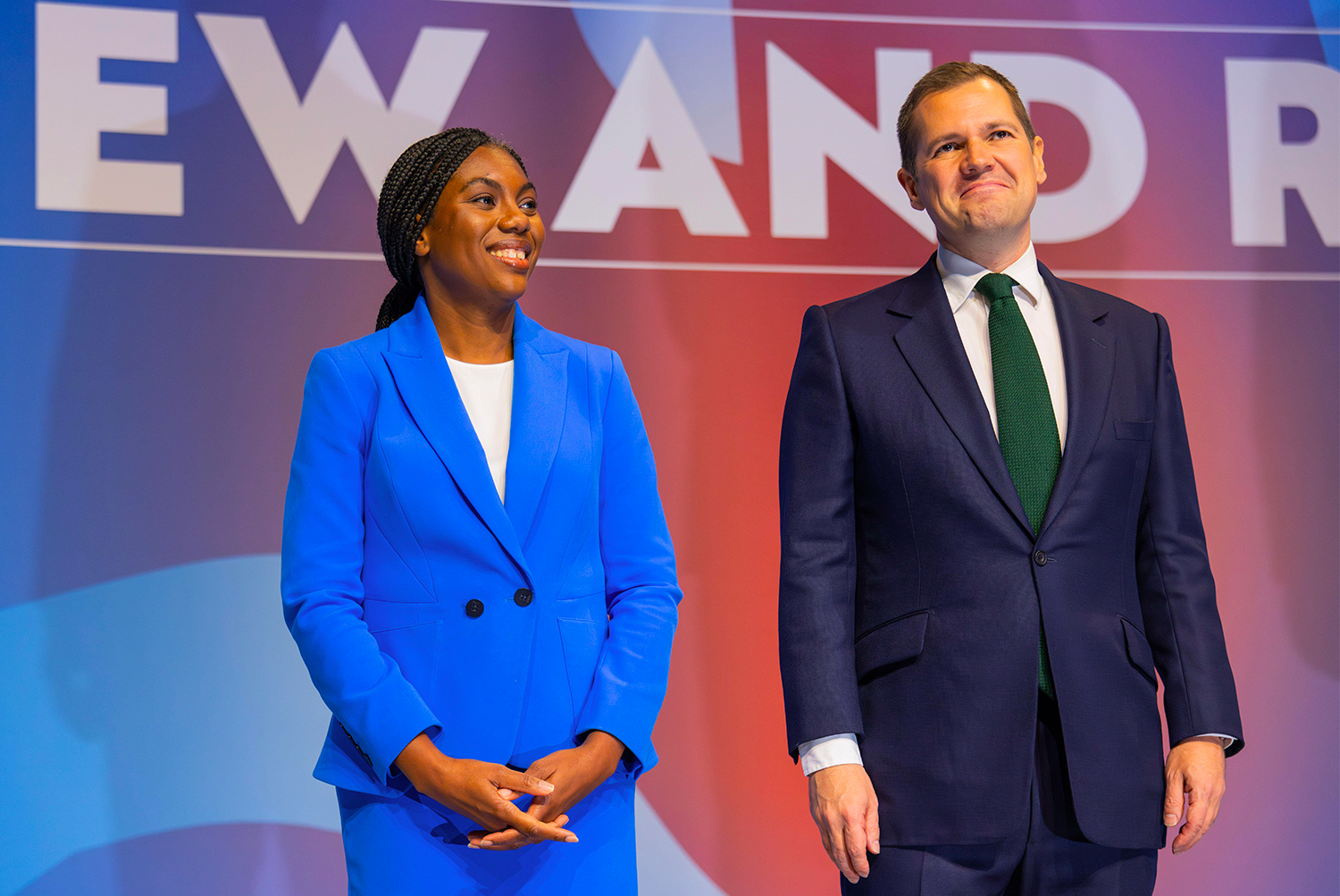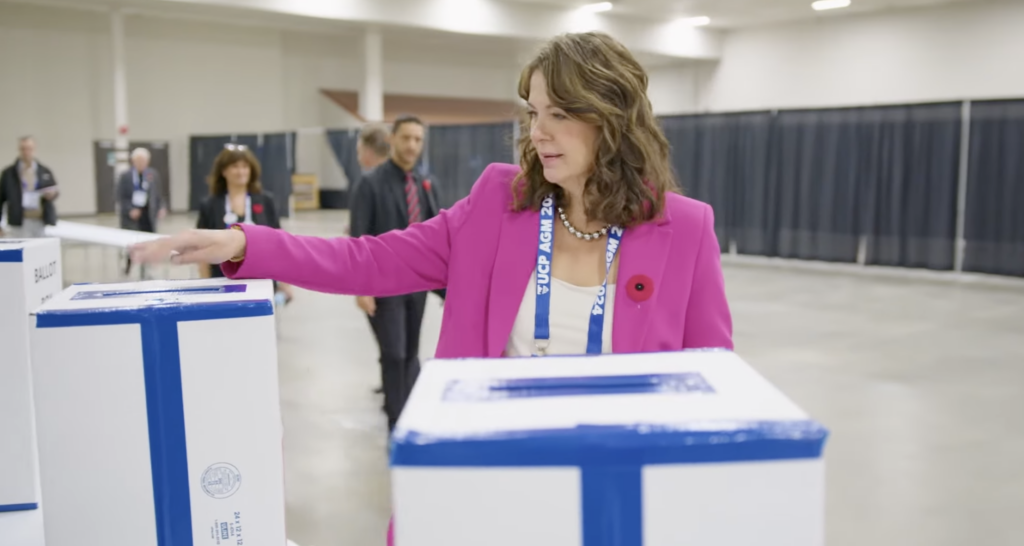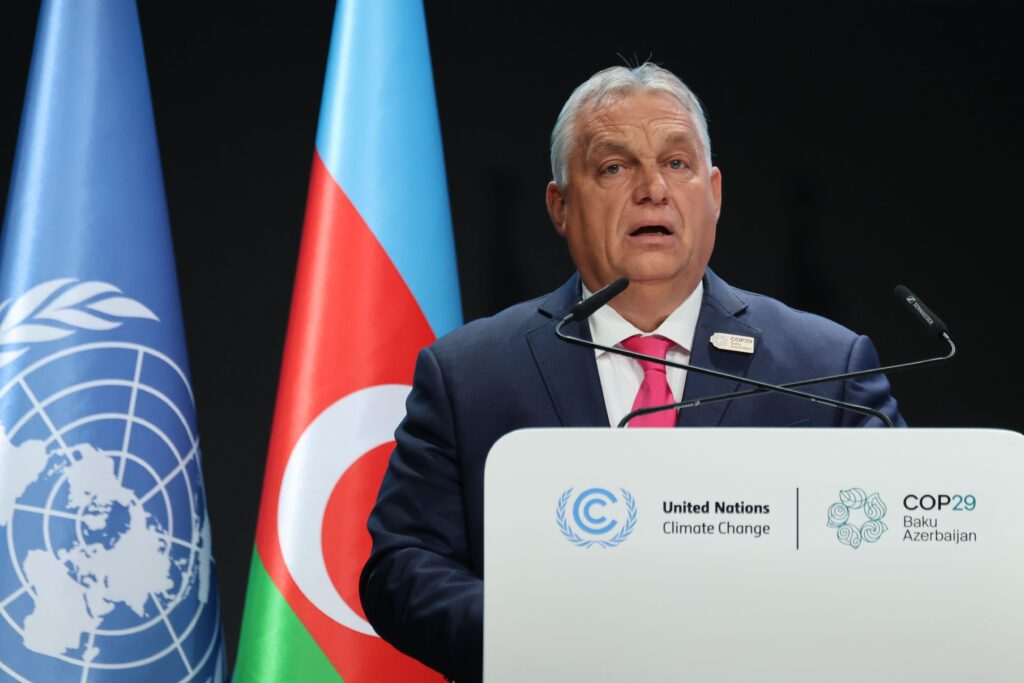The contest for a new Conservative Party leader is nearing its conclusion, with Tory MPs this week voting for Kemi Badenoch and Robert Jenrick as the final two contenders in the race to replace Rishi Sunak, following the elimination of former home secretary James Cleverly.
DeSmog has been tracking the views of all the Tory leadership candidates – including Badenoch and Jenrick – on climate change. Here’s what you need to know about their green records.
Subscribe to our newsletter
Stay up to date with DeSmog news and alerts
Kemi Badenoch
The former business and trade secretary, making her pitch to Conservative MPs at the party’s annual conference on 2 October, described herself as a “net zero sceptic” but “not a climate change sceptic”.
Badenoch said in 2022 that the UK’s 2050 target for achieving net zero emissions – which is based on climate science – was “arbitrary” and last year suggested she would support delaying it.
Scientists at the Intergovernmental Panel on Climate Change (IPCC), the world’s foremost climate science body, have said that without “immediate and deep emissions reductions across all sectors” limiting global heating to 1.5C is beyond reach.
Restricting global temperatures to this threshold – the target agreed as part of the 2015 Paris Agreement – would prevent the worst and most irreversible effects of climate change, but the window to do so is rapidly diminishing.
Badenoch has repeatedly said she wants to reduce emissions but not in a way that would “bankrupt” the country.
The Climate Change Committee, which advises the government on its net zero policies, has estimated that the cost of achieving net zero will be less than one percent of UK GDP, while the government independent spending watchdog – the Office for Budget Responsibility (OBR) – has said that, “the costs of failing to get climate change under control would be much larger than those of bringing emissions down to net zero”.
Badenoch claimed last month that, as business secretary, she “had to work hard to push back against the green lobby”, and condemned Labour’s “foolish decision to ban new licences for North Sea oil production” as part of its “fanatical approach to net zero”.
In August, DeSmog revealed that Badenoch had received £10,000 towards her leadership campaign from Neil Record, a millionaire Tory donor and chair of Net Zero Watch (NZW), the campaign arm of the Global Warming Policy Foundation, the UK’s principal climate science denial group.
Last week, Bloomberg revealed that Badenoch was running her leadership campaign out of Record’s London home.
NZW has called for “rapid” new North Sea oil and gas exploration, and for wind and solar power to be “wound down completely”.
Record – who is also lifetime president of the Institute of Economic Affairs (IEA), a think tank that received funding from oil giant BP every year from 1967 to at least 2018 – in July wrote that achieving net zero by 2050 “will restrict our freedom, and is likely to be eye-wateringly expensive”. Record has donated to both the IEA and GWPF.
As DeSmog revealed last week, Badenoch has also published a 40-page manifesto which cites the Committee to Unleash Prosperity, a U.S. group led by former advisors to Donald Trump, which has likened climate science to believing the earth is flat.
Badenoch’s document, titled ‘Conservatism in Crisis: Rise of the Bureaucratic Class’, attacks what it calls “radical environmental politics” and praises fracking – the controversial method adopted in the U.S. to extract more oil and gas.
Robert Jenrick
The former immigration minister has attacked what he calls Labour’s “net zero zealotry” and has advocated for new fossil fuel extraction, including the opening of new coal mines.
In February, Jenrick wrote an article for The Telegraph – a newspaper that regularly publishes attacks on climate science and net zero reforms – claiming that voters are sick of the “dishonesty” from politicians about “what net zero entails”. He said the UK’s net zero target was “dangerous fantasy green politics unmoored from reality”.
UPDATE 17/10/24: In an interview with GB News on October 13, Jenrick said: “I would go back to the Climate Change Act, I would change it, so that we remove these crazy interim binding legal targets, the carbon budgets. I would certainly fight against Ed Miliband’s mad plan to phase out gas by 2030.”
On 11 July, when Labour announced its decision not to defend the opening of a new coal mine in Cumbria, Jenrick posted on X: “First the oil and gas industry, now coking coal for the steel industry. Less than a week in and jobs and economic growth are already being sacrificed on the altar of Labour’s net zero zealotry.”
In 2021, while serving as communities secretary under Boris Johnson, Jenrick decided not to challenge the planning application for the Cumbria mine – the UK’s first deep coal mine in more than 30 years.
Jenrick responded to Labour’s King’s Speech in July with an attack on the government’s climate policies. Speaking in the House of Commons, Jenrick said that “despite being only responsible for one percent of global emissions, we find ourselves with a government pursuing for ideological reasons a net zero policy which is going to make it harder for our own consumers to afford their bills, [and] which is further going to erode our industrial base”.
Jenrick also attacked Labour’s green investment vehicle, Great British Energy, as a quango “which serves no apparent purpose”, warned that new solar farms would “despoil our countryside”, and claimed that “200,000 jobs in the oil and gas sector have been put in danger”, using a widely debunked figure about Labour’s decision to block new North Sea oil and gas licences.
During his party conference speech last week, Jenrick said that, under his leadership, the “Conservative Party will stand for cutting emissions, but we will never do it on the backs of working people and by further de-industrializing our great country.”
Jenrick also advocated for “cheaper energy”, suggesting this can be achieved through more oil and gas extraction.
This mirrors a speech he gave to the Legatum Institute think tank in May, during which he called for the construction of new “gas power stations”.
Contrary to Jenrick’s claims, since Russia’s invasion of Ukraine in 2022, the UK’s cost of living crisis has been exacerbated by its dependence on fossil fuels, according to the International Monetary Fund (IMF). UK households were the worst hit in western Europe, due to our reliance on gas to heat homes and produce electricity.
“The UK energy crisis is a fossil gas crisis,” Sarah Brown at the energy think tank Ember has said. The OBR has estimated that the government spent close to £70 billion on energy support measures in 2022 and 2023.
However, Jenrick has not always been a critic of climate action. Ahead of the 2019 general election, he said that voters should support the Conservatives on the basis that the UK was the “first advanced economy in the world to pass a net zero target”. A year later, in 2020, Jenrick praised the UK’s “world-leading commitment to net zero by 2050”.
The new Conservative leader will be announced on 2 November.
Subscribe to our newsletter
Stay up to date with DeSmog news and alerts







